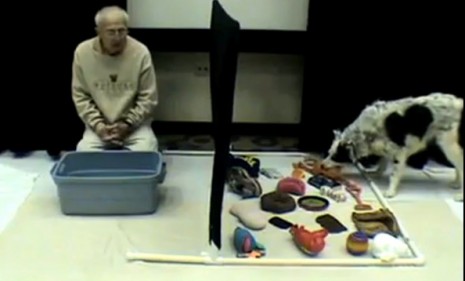The genius dog with a 1,022-word vocabulary
A top dog named Chaser knows the names of over 1,000 objects. How did she get so smart?

A free daily email with the biggest news stories of the day – and the best features from TheWeek.com
You are now subscribed
Your newsletter sign-up was successful
A Border collie named Chaser has gone far beyond "sit," "stay," and "roll over." Working with her owner, a psychologist, and his colleagues at Wofford University in South Carolina, the dog has learned the names of more than 1,000 objects, far surpassing the lexicon of the average pooch and setting a new doggy-vocabulary record. (See Chaser at work.) Here, a brief guide to Chaser and her astounding way with words:
How smart is Chaser?
The dog knows the names of 1,022 objects — mostly toys like distinct balls, stuffed animals, and Frisbees — and can fetch them on command. She understands the principle of exclusion, grabbing a toy she has never seen before when asked for an object she doesn't know. She also understands the subcategories that the objects fall into, such as "balls" and "Frisbees." The dog was tested over a period of three years, and in 838 tests she never scored below 90 percent correct, according to the Wofford researchers' report. The authors of the study, says U.S. News, "admitted that she remembered the names of each of her 1,022 toys better than they could."
The Week
Escape your echo chamber. Get the facts behind the news, plus analysis from multiple perspectives.

Sign up for The Week's Free Newsletters
From our morning news briefing to a weekly Good News Newsletter, get the best of The Week delivered directly to your inbox.
From our morning news briefing to a weekly Good News Newsletter, get the best of The Week delivered directly to your inbox.
How was she taught?
Her owner, Wofford psychologist John W. Pilley, got Chaser as a puppy from a breeder and began training her for four to five hours each day. He would show her an item, repeat its name as many as 40 times, then hide it and ask her to fetch it, continuing to repeat the item's name as she searched for it. In this manner, he taught her the names of one or two new objects each day. On a monthly basis, Pilley would review and reinforce previous lessons. "Unlike human children, she seems to love her drills and tests and is always asking for more," says Nicholas Wade in The New York Times. The dog continues to seek out lessons. "She still demands four to five hours a day," Pilley says. "I'm 82, and I have to go to bed to get away from her."
Are other dogs as smart as Chaser?
Border collies are an exceptionally smart breed of dog, but it's unclear whether Chaser is "an Einstein of the species." Her achievements might simply be within the range of what bright dogs, or at least bright Border collies, can do. Pilley believes the latter, saying that other Border collies "could be pretty close to where Chaser is" with the right training. A German dog named Rico, also a Border collie and the previous dog-vocabulary record holder, was taught to recognize some 200 objects in 2004, an experiment that inspired Pilley to train Chaser. Dr. Alexandra Horowitz, an animal-behavior expert at Barnard College, says "it is not necessarily Chaser or Rico who is exceptional; it is the attention that is lavished on them."
A free daily email with the biggest news stories of the day – and the best features from TheWeek.com
How does Chaser's intelligence compare with that of a human?
"Chaser's abilities place her at an intelligence level equivalent to a 3-year-old human child," says Joanna Zelman in The Huffington Post. On average, children learn 10 new words a day, and know some 60,000 words by the time they graduate from high school. "Chaser learned words more slowly but faced a harder task: Each sound was new and she had nothing to relate it to," says Wade. By contrast, children acquire words in a context — knife, fork, spoon, for example — which makes remembering them easier.
Sources: U.S. News, New York Times
-
 Is Andrew’s arrest the end for the monarchy?
Is Andrew’s arrest the end for the monarchy?Today's Big Question The King has distanced the Royal Family from his disgraced brother but a ‘fit of revolutionary disgust’ could still wipe them out
-
 Quiz of The Week: 14 – 20 February
Quiz of The Week: 14 – 20 FebruaryQuiz Have you been paying attention to The Week’s news?
-
 The Week Unwrapped: Do the Freemasons have too much sway in the police force?
The Week Unwrapped: Do the Freemasons have too much sway in the police force?Podcast Plus, what does the growing popularity of prediction markets mean for the future? And why are UK film and TV workers struggling?